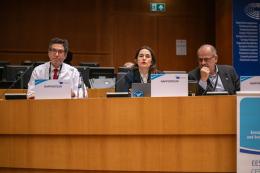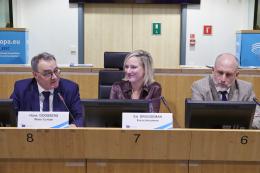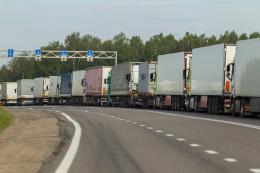European Economic
and Social Committee
Main navigation
-
Om
ABOUT
The European Economic and Social Committee (EESC) is the voice of organised civil society in Europe.
Find out more about its role and structure at http://www.eesc.europa.eu/en/about
- Politisk struktur
- Administrativ struktur
- SAMARBETE MED ANDRA INSTITUTIONER
- Rules
-
Vårt arbete
OUR WORK
The EESC issues between 160 and 190 opinions and information reports a year.
It also organises several annual initiatives and events with a focus on civil society and citizens’ participation such as the Civil Society Prize, the Civil Society Days, the Your Europe, Your Say youth plenary and the ECI Day.
Find the latest EESC opinions and publications at http://www.eesc.europa.eu/en/our-work/opinions-information-reports/opinions and http://www.eesc.europa.eu/en/our-work/publications-other-work/publications respectively.
- Yttranden och informationsrapporter
- Dokument
- Publikationer och andra arbeten
-
Det civila samhället och medborgarnas deltagande
- Civil Society Week
- European elections 2024
- Priset till det civila samhället
- The Conference on the Future of Europe
- Europeiska demokratipasset
- Ditt Europa, din mening
- Europeiska medborgarinitiativet
- The path to our industrial future
- Youth Climate and Sustainability Round Tables
- EU Organic Awards
- Civil Society Against COVID 19
- EESC stands with Ukraine
- Partnerships
- Relations with ESCs
-
Politik
POLICIES
The EESC is active in a wide range of areas, from social affairs to economy, energy and sustainability.
Learn more about our policy areas and policy highlights at http://www.eesc.europa.eu/en/policies
-
Politikområden
- Jordbruk, landsbygdsutveckling och fiske
- Klimatåtgärder
- Sammanhållnings-, regional- och stadspolitik
- Konsumenter
- Digital förändring och informationssamhället
- Ekonomiska och monetära unionen
- Utbildning
- Sysselsättning
- Energi
- Näringsliv
- Miljö
- Yttre förbindelser
- Finansiella tjänster och kapitalmarknader
- Grundläggande och medborgerliga rättigheter
- Housing
- Industri och industriell omvandling
- Institutionella frågor och EU:s budget
- Migration och asyl
- Forskning och innovation
- Tjänster av allmänt intresse
- Den inre marknaden
- Sociala frågor
- Hållbar utveckling
- Beskattning
- Transporter
-
Politikområden
-
Agenda
AGENDA
The EESC holds nine plenary sessions per year. It also organises many conferences, public hearings and high-level debates related to its work.
Find out more about our upcoming events at http://www.eesc.europa.eu/en/agenda/our-events/upcoming-events
- Våra evenemang
-
Nyheter och medier
NEWS & MEDIA
Here you can find news and information about the EESC'swork, including its social media accounts, the EESC Info newsletter, photo galleries and videos.
Read the latest EESC news http://www.eesc.europa.eu/en/news-media/news and press releases http://www.eesc.europa.eu/en/news-media/press-releases
- Ordförande
-
Ledamöter och grupper
MEMBERS & GROUPS
The EESC brings together representatives from all areas of organised civil society, who give their independent advice on EU policies and legislation. The EESC's326 Members are organised into three groups: Employers, Workers and Various Interests.
Find out more about our Members and groups at http://www.eesc.europa.eu/en/members-groups
- Ledamöter
- Grupper
-
Sektioner och andra organ
SECTIONS & OTHER BODIES
The EESC has six sections, specialising in concrete topics of relevance to the citizens of the European Union, ranging from social to economic affairs, energy, environment, external relations or the internal market.
Find out more at http://www.eesc.europa.eu/en/sections-other-bodies
-
Facksektioner / utskott
- Ekonomiska och monetära unionen, ekonomisk och social sammanhållning (ECO)
- Inre marknaden, produktion och konsumtion (INT)
- Transporter, energi, infrastruktur och informationssamhället (TEN)
- Sysselsättning, sociala frågor och medborgarna (SOC)
- Jordbruk, landsbygdsutveckling och miljö (NAT)
- Yttre förbindelser (REX)
- Rådgivande utskottet för industriell omvandling (CCMI)
- Observationsgrupper
- Övrigt
-
Facksektioner / utskott
- Ukraine















